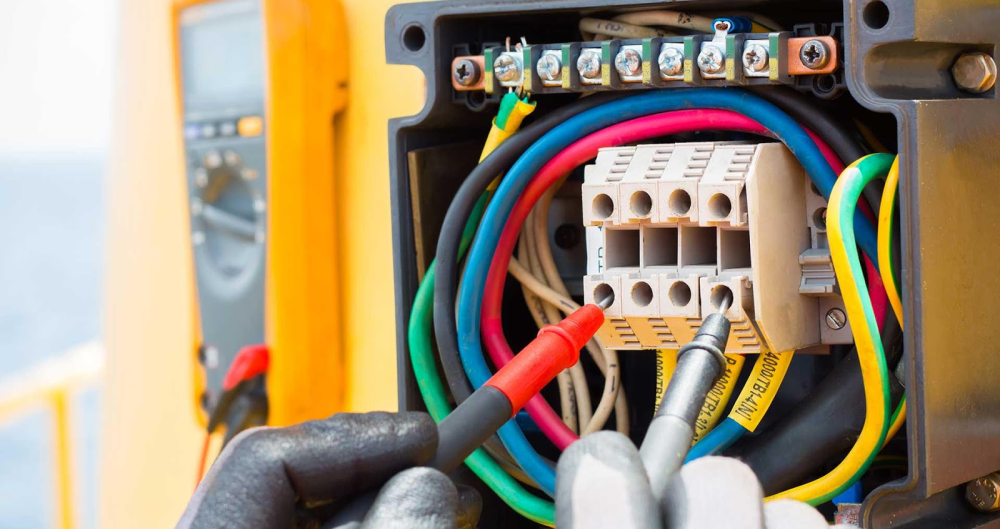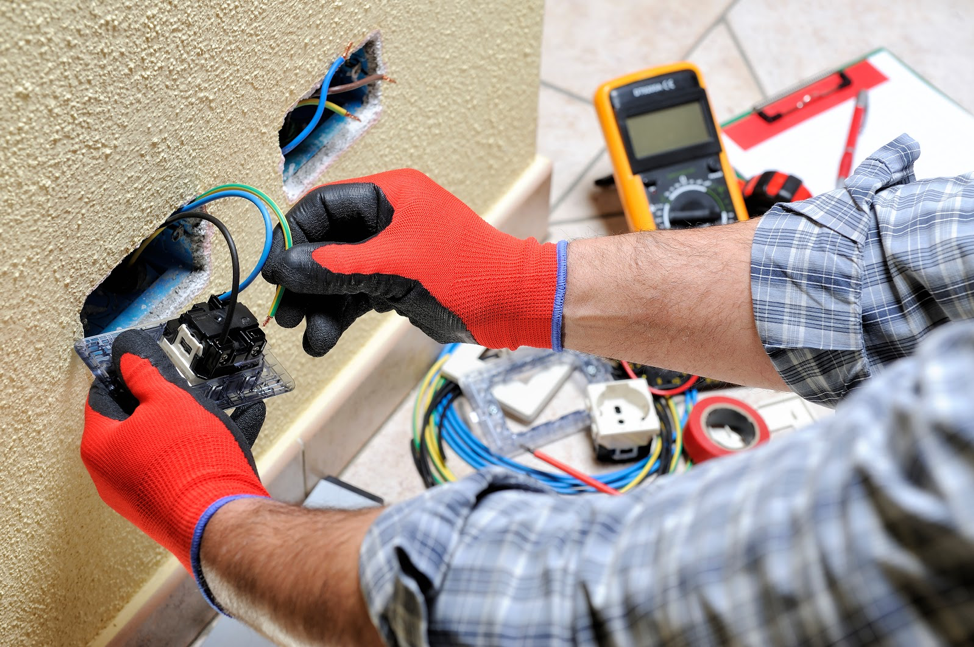As an electrician, having the right tools is critical to job success and will save you a lot of time. Electricians rely on tools for accuracy, flexibility, craftsmanship, comfort and safety. We’ve compiled this list of electrician tools that both apprentice and skilled electricians will need, and buying the right tools the first time will save you money. Ready to start your career with the best equipment?

Safety helmets
While your helmet may not be the most popular part of your equipment, it will significantly reduce the risk of a traumatic brain injury or death acquired through the workplace. The U.S. Department of Labor, Occupational Safety and Health Administration (OSHA)requires anyone working in areas where there is a risk of falling or flying objects, electric shock or burns to wear a helmet. In conjunction with the American National Standards Institute (ANSI), OSHA sets the minimum standards for helmets to be worn on the job. Before purchasing a helmet, make sure you are familiar with the helmet requirements.
Tool Belt
A good tool belt is an essential item in any electrician’s tool arsenal. An electrician’s tool belt is designed to meet your needs in the field and includes pockets for storing all the tools you need on the job, such as wire strippers, pliers and screwdrivers. Because it fits around your waist, carrying a tool belt allows you to have many of the tools you need for a particular job on hand, even when working in tight spaces where a toolbox or bag may not fit. When choosing a tool belt, look for the right fit for your body and enough slots to fit your tools.
Work gloves
There are many types of electrical work gloves, including rubber insulated gloves, leather protective gloves and wirework gloves. Rubber insulated gloves protect you from electric shock, while leather gloves protect you from cuts and burns. Often, leather gloves are worn over rubber insulated gloves to provide an extra layer of protection. Your choice will depend on the type of work you will be doing and the OSHA regulations for the industry. Typically, you should look for gloves that are appropriate for the voltage you will be using. Most electricians have at least two pairs of gloves in their toolbox.
Work boots
Electricians always need to consider safety, and investing in a sturdy pair of work boots is essential to ensure your safety on the job. Work boots will protect your toes from impact, compression and puncture injuries. For electricians, purchasing electrically resistant (EH) footwear can also protect you from electrical burns and shocks. Composite panels replace the traditional steel toe in EH footwear, which also has a shock-resistant sole and heel. When investing in boots, consider the climate in which you want to work. For example, you may need winter insulated boots and wet weather waterproof boots.
Pliers
Pliers are a relatively common tool in many industries, and there are many different types of pliers for different purposes, including cutting, gripping and multi-functional. For electricians, crimpers, sharp nose pliers and lineman’s pliers will be an important part of your tool kit and a great place to start when purchasing tools. lineman’s pliers are multifunctional and should be able to cut, clamp and crimp wires. For safety reasons, electricians will choose pliers with insulated handles. It may take some time to get a feel for the features you like best, so start with the basics and add to your toolkit as needed.
Wire stripper
Wire strippers are a well-known tool used by professionals and DIY hobbyists to strip wire insulation. Professional electricians will want to look for a higher quality version, called a combination tool, which can also be used to cut thicker cables, crimp terminals and cut screws. Stripping the wire needs to be clean, as damaging the wire is a safety hazard that can create hot spots or arcs. You should look for round holes with round holes for different sizes of wire so you can create clean cuts without twisting or twisting the wire.

Circuit Breaker Finder
Circuit breaker finders are used to map current and identify which circuit breaker is connected to an outlet or fixture. These units are primarily used outside of industrial environments where metal encapsulated circuits make them ineffective. When purchasing a circuit breaker finder, you will want to avoid the ones that adjust automatically. Look for a manual breaker finder, which allows you to fine-tune the sensor to improve accuracy. This ability to adjust is especially important in dense residential areas where signals can easily cross. You’ll also want to make sure the device you purchase is UL listed and GCFI compatible.
Hammer
An electrician’s hammer is more than just a hammer; it has several functions specific to the work of an electrician. Electrical conductivity is always a factor in electrical work, so an electrician’s hammer has a rubber-coated fiberglass handle to prevent accidental electrocution. In addition, the head of the hammer is longer and the claws of the hammer can reach into tight spots. Look for an ergonomic design that is well balanced and heavy enough for striking.
Fish Strap
There is no electrician without a fish tape. Fish tapes help you get through walls and conduits and guide wires through walls and conduits that can’t be accessed any other way. These rigid and flexible tapes are used as wire guides and are available in a variety of materials such as steel, stainless steel and fiberglass. When buying fish tape, you need to consider the length and tensile strength, as well as the type of wire you plan to use the most. If you’re just starting out in your career and aren’t sure what to buy, steel is a great choice for fish tape because it’s durable and low cost.
Screwdrivers
Electricians use a variety of screwdrivers to loosen and tighten various hardware parts. Many professionals now carry versatile, adaptable screwdrivers with interchangeable parts, so they’ll never get stuck without the proper electrical maintenance tools.
Tape Measure
When working with electrical wire, it’s important to know the exact measurements when cutting anc stripping. A simple retractable tape measure can do this, but existing tape measures with magnetic heads, multi-stage locks and other features can make the process easier.
Electrical tape
This adhesive, made of plastic, vinyl or fiberglass cloth, is pressure sensitive and essential for insulating electrical wires or other conductive materials. Electrical tape prevents the accidental transfer of electric current to other wires and possible electrocution when in contact with live wires.
Nylon Ties
Also known as zipper ties, these inexpensive fasteners are great at tying cables or wires together. Use cable ties to keep electrical spaces neat and organized. If you need to use a large number of ties, use a cable tie gun to get the job done easily and quickly.
Electric drill
Electricians regularly install new lighting fixtures or need to remove installed hardware to access wires and other electrical components. Handheld drills equipped with a variety of drill bits help expedite these tasks and allow professionals to install specialized bits for industry-specific uses.
Coaxial Cable Connectors
Coaxial connectors connect cables to equipment while protecting them from shredding. Multiple connectors exist, and keeping multiple connectors on hand ensures that you always meet the needs of your customers.

Junction Boxes
These modular, insulated devices help electricians put multiple wires together. They are used to connect wires to ground, or to connect electrical switches and outlets to power
Voltage testers
In order to work safely electrically, power must be disconnected in critical areas (usually through circuit breakers). A handheld voltage tester allows electricians to test electrical outlets so they know when it is safe to work. Electricians also use this tool to confirm that power has been restored.
Flashlight
For an electrician, working in the dark is a potential hazard of the job. Keep necessary electrician’s tools, such as flashlights and various other work lights, close at hand and within reach.
Safety glasses
Electricians should take care to protect their eyes when carefully inspecting electrical wires or operating power tools. Apprentices and experienced veterans are required to wear a pair of safety glasses at every job site as part of an electrician’s required tools.
Multimeter
A multimeter, also known as a volt/ohmmeter (VOM), is vital to any electrician’s toolkit. A standard multimeter will measure voltage, current and resistance, but newer multimeters can perform many more tests. When choosing a multimeter, you need to consider its range and measurement capabilities. Avoid buying a cheaper unit with a shorter range than you will need when working with it. Another important feature for professional electricians is the ability to measure AC and DC, as well as a backlit reading panel for working in tight dark spaces. You should expect to spend $50 to $100 on a quality multimeter.
Keywords:electrician tool
Recommended books for electricians
1.10 must-read books for electricians in 2021! Recommended by Master Electricians
2.Best Books For Electricians|Must-read books for those who want to become electricians
3.5 Best Home Electrical Wiring Books for Beginners | Electricians Guide
4.Top And Best Books And Guides For Electricians And Apprentices | Knoweasy Electrician Guide
5.The Best Electrician Books For Beginners: Top Six Sellers In 2022
6.12 Must ReadBooks For Electricians In 2022 Recommended By Master Electricians| Knoweasy Electrician Guide